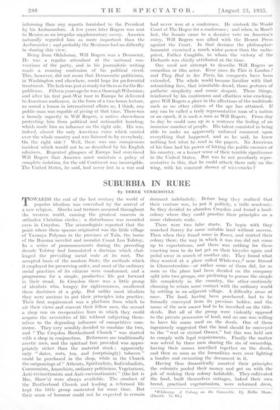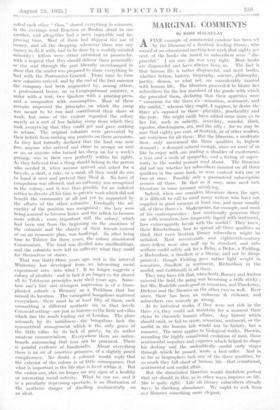SUBURBIA IN RURE
By DEREK VERSCHOYLE
TOWARDS the end of the last century the world of popular idealism was convulsed by the arrival of a new religion. Shocks and tremors occurred throughout the western world, causing the greatest concern in orthodox Christian circles : a disturbance was recorded even in Croydon. The seismologists reported that the point where these spasms originated was the little village of Yasnaya Polyana in the province of Tula, the home of the Russian novelist and moralist Count Leo Tolstoy. In a series of pronouncements during the preceding decade Tolstoy had formulated a doctrine which chal- lenged the prevailing social code at its root The accepted basis of the modern State, the methods which it employed for preserving order, and most of the ordinary social practises of its citizens were condemned, and a programme for a simple, productive life put forward in their stead. In Croydon there was a little group of idealists who, hungry for righteousness, swallowed these doctrines at a gulp. But unlike most idealists they were anxious to put their principles into practice. Their first requirement was a platform from which to air their views and convert their fellow men, the second a shop run on co-operative lines in which they could acquire the necessities of life without subjecting them- selves to the degrading influence of competitive com- merce. They very sensibly decided to combine the two, and " The Croydon .Brotherhood Church " was started with a shop in conjunction. Reformers are traditionally ascetic men, and the spiritual fare provided was appro- priately richer than the material stock : apparently only " dates, nuts, tea, and (surprisingly) tobacco " could be purchased in the shop, while in the Church the outpourings of " Atheists, Spiritualists, Individualists, Communists, Anarchists, ordinary politicians, Vegetarians, Anti-vivisectionists and Anti-vaccinationists " (the list is Mrs. Shaw's) were always available. The conduct of the Brotherhood Church and leading a reformed life kept the little group contented for sonic time. But their sense of humour could not be expected to. remain dormant indefinitely. Before long they realized that their venture was, to put it politely, a trifle academic. So they decided to abandon Croydon and found a land- colony where they could practise their principles on a more elaborate scale.
There • were two false starts. To begin with they searched Surrey for some suitable land without success. Then when they found some in Essex, and started their colony there, the way in which it was run did not come up to expectations, and there was nothing for these exacting men to do but get on their bicycles again and pedal away in search of another site. They found what they wanted at a place called Whiteway,* near Stroud in Gloucestershire—or rather some of them did, for as soon as the place had been decided on the company split into two groups, one preferring to pursue the simple life completely in the country, the other cautiously choosing to retain some contact with the ordinary world by settling in an adjacent village. A difficulty arose at once. The land, having been purchased, had to be formally conveyed from its previous holder, and the name of the new owner had to be inscribed on the title- deeds. But all of the group were violently opposed to the private possession of land, and no one was willing to have his name used on the deeds. One of them ingeniously suggested that the land should be conveyed to the " real or eternal Owner," but this was held not to comply with legal. requirements. Finally the matter was solved by three men sharing the sin of ownership, having their names inscribed together on the deeds, and then as soon as the formalities were over lighting a bonfire and cremating the document in it.
Having thus dramatically asserted their principles the colonists pooled their money and got on with the job of making their colony habitable. They cultivated the land, built •themselves cottages, baked their own bread, practised vegetarianism, wore reformed dress, *Whiteway. A Colony on the Cotswolds. By Xollio Shaw. (Daniel. 7s. ed.) called each other " thou," shared everything in common, in the evenings read Emerson or Ruskin aloud to one another, and altogether had a most enjoyable and im- proving time. Most of them had abjured the use of money, and all the shopping, whenever there was any money to do it with, had to be done by a worldly-minded minority ; letters were either entrusted to passers-by, with a request that they should deliver them personally, or else sent through the post liberally overstamped to show that the sender was prepared to share everything he had with the Postmaster-General. From time to time new colonists arrived, and by the end of the first summer the company had been augmented by, among others, a professional boxer, an ex-Congregational minister, a sailor with a tent, two Quakers with a printing-press, and a compositor with consumption. Most of these recruits respected the principles on which the camp was meant to be run and contributed their share of work, but some of the visitors regarded the colony merely as a sort of free holiday camp from which they took everyt;.:ng that they could get and gave nothing in return. The original colonists were prevented by their beliefs from making any protests on these occasions. As they had formally declared that the land was now • free, anyone who arrived and chose to occupy an acre or so, or 'anyone who turned his sheep on for a week's grazing, was in their eyes perfectly within his rights. As they believed that a thing should belong to the person who needed it, when anyone arrived and asked for a bicycle, a shirt, a rake, or a meal, all they could do was to hand it over and pretend they liked it. No form of compulsion was allowed, and no authority was recognized in the colony, and it was thus possible for an indolent settler to devote all his time to private work which did not benefit the community at all and yet be supported by the • efforts of the other colonists. Gradually the ad- surdity of the position was recognized : the lazy were being assisted to become lazier, and the selfish to become more selfish ; more important still, the colony, which had been run from the beginning on the emotions of the colonists and the charity of their friends instead of on an economic plan, was bankrupt. So, after being true to Tolstoy for three years, the colony abandoned Communism. The land was divided into smallholdings, and the colonists were left to cultivate what they could for themselves or starve. .
That was thirty-three years ago, and in the interval Whiteway has developed from all interesting social experiment intointo what ? It no longer suggests a colony of idealists—and in fact it no longer is, for almost all its Tolstoyan principles were shed years ago. Some- how one's first and strongest impression is of a trans- planted suburb—a Hornsey or a Peckham that has missed its location. The variegated bungalows scattered everywhere—there must be at least fifty of them, each committing a different aesthetic sin in that lovely Cotswold setting—are just as hideous as the little red villas which line the roads leading out of 'London. The place astounds by its untidiness—the bungalows lack the 'symmetrical arrangement which is the only grace of the little villasby its lack of gaiety, by its rather amateur commercialism. Everywhere there are notice- boards announcing that teas can be procured. There is painful evidence of handicrafts. About everything there is an air of assertive primness, of a slightly posed complacency. No doubt a. colonist would reply that the exterior of the colony is of little consequence, that what is important is the life that is lived within it. But 'the visitor can, alas, no longer see any signs of a healthy or interesting social activity. What he can see, and it is a peculiarly depressing spectacle, is an illustration of the aesthetic danger of dwelling sentimentally on an ideal.



































 Previous page
Previous page